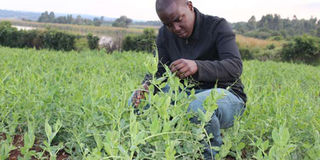I have burnt my fingers twice but won’t stop farming

Joachim Samoei inspects his peas crop in his farm in Eldoret. He grows two varieties of peas; the summer and ambassador, alongside onions, traditional vegetables and cabbages on the two-acre farm. PHOTO | STANLEY KIMUGE | NATION MEDIA GROUP
What you need to know:
- Samoei began the venture as a hobby last November after asking his father to allow him farm on a section of his land that was lying fallow.
- To grow the plant, he ploughs and harrows the land, then plants the seeds, which he buys from an agrovet in Eldoret, directly into the soil just like maize and beans.
- He is now hopeful to make a good harvest in about a month’s time because the crops are doing well after spraying with pesticides.
The slender plants on the farm in Kesses, Eldoret, dance from right to left as the wind blows incessantly.
Twenty-six-year-old Joakim Samoei stands on the edge of the farm looking at the plants keenly. Samoei, 26, grows two varieties of peas, the summer and ambassador, besides onions, traditional vegetables and cabbages on a two-acre farm.
The ambassador peas mature faster compared to the summer variety.
“The peas have white flowers and mature two weeks earlier than the other variety. They fetch between Sh40 and Sh80 per kilo in the market.”
Samoei began the venture as a hobby last November after asking his father to allow him farm on a section of his land that was lying fallow.
The farm sits adjacent to Kesses dam, which enables the farmer to grow his crops round the year.
“I spent about Sh10,000 to clear bushes, plough and plant cabbages. I had hoped to sell in February when demand is high but the Sitatunga from the nearby Kesses dam destroyed most of the crop,” says Samoei, who graduated from Moi University with a Bachelors degree in Information Science in 2013.
Later in April, he reduced the acreage under cabbage and planted the spiderplant (sagaa, saget, dek or tsisaka) after doing market research. He figured that the crop could not be attacked by the antelopes.
He sold the indigenous vegetables on high demand to traders in Eldoret town at Sh1,500 per 50kg bag, which he harvested for three weeks.
“At first I was sceptical but I was surprised the demand was huge. The second time in June, however, I was not lucky. I planted the crop but it was destroyed by extreme temperatures,” he explains, adding the vegetable takes one-and-half months to mature, but the spider mites which suck the sap are a big challenge.
FIX NITROGEN IN THE SOIL
His never-say-die spirit made him switch to peas, which are less sensitive to extreme weather.
“I also wanted to control soil diseases by practising crop rotation. The peas also help to fix nitrogen in the soil,” says Samoei, who has spent close to Sh150,000 on his agribusiness.
To grow the plant, he ploughs and harrows the land, then plants the seeds, which he buys from an agrovet in Eldoret, directly into the soil just like maize and beans.
“They germinate after seven days depending on the moisture content in soil. Weeding is done at four weeks. The high-yielding ambassador matures after two-and-half months while the summer variety (English peas) takes three months. The summer is a bit sugary compared to the other variety.”
So how does he manage to juggle between the farm work and his job at Moi University, where he does clerical work on contract?
“I pass by the farm to check on the progress every morning and evening. There are some pests that attack them which the workers may not know,” notes Samoei, who has lost some of his peas to blight.
However, he is now hopeful to make a good harvest in about a month’s time because the crops are doing well after spraying with pesticides.
“The future is in farming because population is rising fast. I want to supply food. I fell in love with agriculture after campus though I never studied it in high school.” “Despite the challenges and missteps, I am not about to quit. I will get things right,” he adds.
Lilian Samoei, a horticulture expert at Egerton University, says farmers who grow peas need to be on the lookout of pests and diseases at early stages and during the dry seasons.
****
PESTS AND DISEASES
- During the dry spell, according to Lilian Jeptanui, a crops expert from Egerton University, pests such as aphids, pod borers and bean flies tend to multiply and attack the peas.
- She notes there is also need to do crop rotation and maintain field hygiene while growing peas. Rotating the crops with onions help to curb against the pests or insects.





